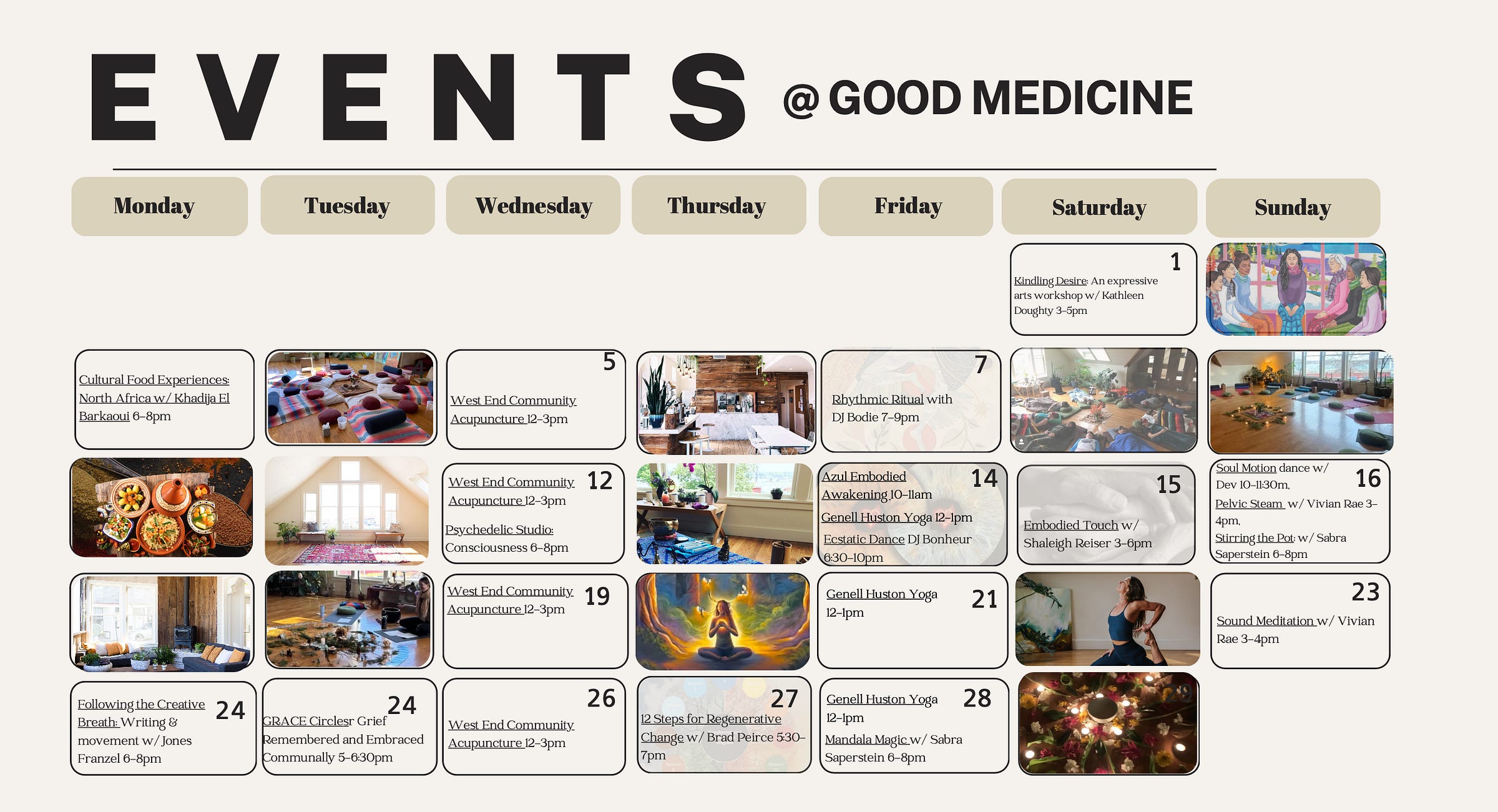Good Medicine News: February ‘25
Monthly Newsletter featuring upcoming events at GMC, creative reflections and critical commentary from our Collective members on the front lines of healing and consciousness change work.
A Word on Grief…
It seems improbable that I’m co-facilitating groups about grief this year (GRACE Circles and KAP for the Grieving Soul).
I used to believe I was “not a crier,” meaning I rarely shed actual tears and if I did, it happened only when I was alone. It wasn’t that I was forcefully holding tears back, I just didn’t feel them stir. And I consider myself an empathic person, so it always seemed disconcerting to me. Could my egoic defenses really be that stealthy? Somewhere along the way, I learned that stoicism meant strength and resilience and that tears were a sign of weakness and self-indulgence. I’m sure my medical school training and most other entrainment in American socialization of the 80’s and 90’s reinforced this belief. Probably, if I looked closely enough, I could also find an old friend, unworthiness, in the mix. There is so much suffering in the world, what right do you have to grieve?
Ashley Jansen, interfaith minister and grief teacher, offered that my story of “I don’t cry,” is a signature of unmet grief. Some of us stopped crying (or never began) because who was there for us? Who understood? Who openly grieved and invited us in? Ashley says “Some of us may recognize that our lives are kind of flatlining. That’s because our grief is held within. Until we exhale we can’t access our joy. Our addictions and coping strategies have developed in the absence of genuine grief spaces.”
It wasn’t until doing a year of Grief Circles with Ashley that I began to recognize that grief is as much a practice as an emotion. Learning how to make contact with and be witnessed in my grief regularly has slowly changed the way I move through and am moved by life: to be moved to tears simply by being still and allowing the miracle of this moment- it’s birth and death at once- to fully permeate my experience. To turn compassionately towards the outlawed feelings: disappointment, regret and shame, heartbreak, mistakes, losses. And, in my stillness, let them move me.
Practicing grief is not an invitation to wallow in despair. In fact, it’s just the opposite. Grief is the back door into joy. Our tears become the holy water of love made explicit, not something to be hidden, ashamed of, or even healed! Many of us carry the misconception that our grief is an act of catharsis to be completed, done with. Another Ashley gem: “Our grief doesn’t need to be healed. Our healing needs grief.” Grief itself is the healing agent, the great alchemizer. If we fool ourselves into believing we’ve got nothing to grieve or it’s too big or it’s over, then we may miss out on our most potent innate medicine.
Grief is our human birthright. No matter who you are or where you’re from. Just contemplate for a moment Francis Weller’s first gateway into grief: “Everything we love, we will lose” (The Wild Edge of Sorrow). If you believe you have nothing to grieve, try standing face to face with that truth.
I’m learning to allow everything we love, we will lose, to settle into the fluid of my body, to become the way. To let it soften my defenses, alchemize my forgetfulness into presence. I will leave you with an excerpt from a poem by Jeff Foster that I keep close by as I explore my own relationship to grief: You Will Lose Everything.
Experience will gradually, or not so gradually, strip away everything that it can strip away. Waking up means facing this reality with open eyes and no longer turning away.
But right now, we stand on sacred and holy ground, for that which will be lost has not yet been lost, and realising this is the key to unspeakable joy. Whoever or whatever is in your life right now has not yet been taken away from you. This may sound trivial, obvious, like nothing, but really it is the key to everything, the why and how and wherefore of existence. Impermanence has already rendered everything and everyone around you so deeply holy and significant and worthy of your heartbreaking gratitude. Loss has already transfigured your life into an altar.
In the midst of all that is unfolding and changing around us, ”keep your grief warm.**”
Ever with love,
Liz
**Instructions from Francis Weller
Good Medicine Non-Profit Events:
Regular donation-based offerings, to support community building, education and access to healing.
Psychedelic Studio- TONIGHT @ 6pm

GRACE Circles- February 25th @ 5pm

February Collective Calendar
**For linkable calendar, download above PDF
Notes From the Field
Creative pieces from members of the Collective. This month features a tanka by Liz Strawbridge. A tanka (短歌 tan-kah) is a short poem originating in 13th century Japan. They are five lines with the syllable pattern (7/7/5/7/5) and often convey deep feelings about nature, love, or desire. Secondly, is a podcast with Good Medicine / Riverbird Providers Selma Holden, MD and Matt Stevens, DO who share about community, ceremony and transformation on the podcast Pyschedelics Today.

Good Medicine Collective
GMC Core Providers
GMC Community Partners
Andrew Forsthoefel / Cinnamon Brulée / Desi Lester / Genell Huston/ Ginny Gill / Jonah Fertig-Burd / Janice Irvine / Michael Leary / Samantha Hubbell/ Small’s Cafe / Sasha Lamour / Sarah Siegel / Tana Forsthoefel / Terry Ann Scriven/ Therese Jornlin, Danielle Dellaquila, Todd Larlee, Vivian Rae Wellness, Natasha Salvo & Good Movement, Regenerative Maine (Elizabeth Holmstrom, Brad Peirce, Michael Stern), Tim Mclain, Khadija el Barkaoui, Sabra Saperstein
Thank you to the vital humans who support this project including Stewart Strawbridge, CJ Dirago, Desi Lester, Kristen Robichaud and Patti Keil.







